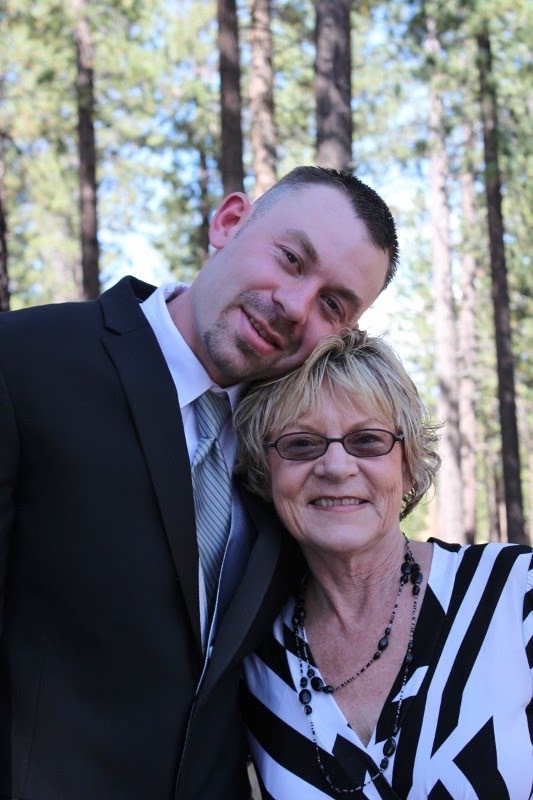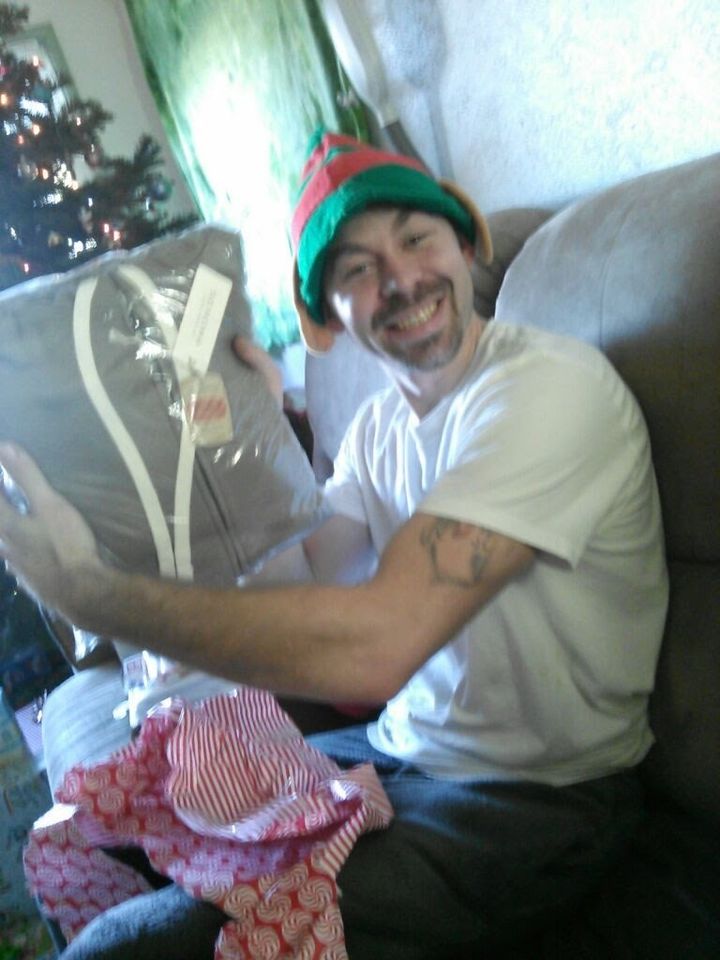A Jail Diagnosed Him With HIV — Then Denied Him Life-Saving Medication, Lawsuit Says
Attorneys said Nicholas Overfield first discovered he was HIV-positive when he was taken into custody at El Dorado County Jail in Northern California in 2017. In 2020, while he was living in the Lake Tahoe area, a doctor prescribed him Juluca, an antiretroviral drug crucial in controlling the virus and preventing life-threatening complications, according to excerpts of medical records reviewed by HuffPost.
However, when Overfield was arrested for failing to appear in court in February 2022 and detained at that same jail, he was denied the medication — even though staff with Wellpath, the company contracted to provide health care at the jail, had received records from his doctor that he was taking it, according to an ongoing lawsuit brought by his mother, Lesley Overfield, against the company and El Dorado County. He died after 63 days in custody, before he was ever sentenced for the burglary charge to which he ultimately pleaded no contest. He was 38 years old.
Advertisement
“He was just a good kid. He just did everything, and it’s just really sad that he didn’t get to complete his life and do what he wanted to do,” Lesley Overfield told HuffPost, describing her son as a “kind, loving, generous” father to two boys, ages 8 and 10.

Family Handout
Under a 1976 Supreme Court ruling, jails and prisons cannot show “deliberate indifference” to the medical needs of people in their custody. Though Lesley Overfield said that she was concerned when her son was arrested in 2022, she believed he would be okay in the “controlled environment” of the jail. Instead, her lawsuit said Wellpath never treated her son for HIV, in spite of the records from his doctor that were received on the first day of his detention, his repeated pleas for his medication and jail staff’s documentation in his patient files that his health was deteriorating. As a result, he developed AIDS and related complications that killed him, the lawsuit said.
Wellpath declined to comment to HuffPost, and El Dorado County officials did not respond to a request for comment. They have not yet responded to the suit’s amended complaint, which was filed Aug. 21 in federal court, but in a previous court filing, El Dorado County said Lesley Overfield’s attorneys had not shown that jail policies violated Nicholas Overfield’s rights. Wellpath sought to have the suit dismissed and said its claims against the company had no merit. The newly amended complaint now also names a doctor, nurses, a health services administrator and law enforcement officers who it says are also responsible for Nicholas Overfield’s death. They also have not responded to the lawsuit’s claims and could not immediately be reached by HuffPost.
Advertisement
Wellpath, which is the nation’s largest private, for-profit provider of health care services in prisons and jails, has in recent years come under fire for its alleged treatment of incarcerated people in multiple U.S. states. In December 2023, Democratic senators including Elizabeth Warren (Mass.) and Cory Booker (N.J.) wrote a letter calling out the company’s alleged “inadequate care at federal, state, and local prisons and jails.” In a detailed response, Wellpath’s executive vice president and chief legal officer Marc Goldstone pointed to the difficulties of providing treatment in jail and prison facilities to patients whose health has often been impacted by adverse environments or social conditions while also defending the quality of its care.
“Our company promotes rigorous standards of care, invests in innovation, and values compassionate service,” Goldstone said at the time.
The company also responded to a question about whether incarcerated patients’ medications are ever changed or not provided without approval from the original prescribing doctor.
“All medications are reviewed for clinical appropriateness by licensed medical professionals,” Goldstone said.
The company has also faced other lawsuits, including one in the 2021 death of Maurice Monk at the Santa Rita Jail that resulted in a $7 million settlement from Alameda County; the county did not admit wrongdoing. His family’s civil suit against Wellpath is ongoing, and in court filings, the company has said it is not responsible for his injuries and death. The Alameda County District Attorney is also investigating the case and has said evidence suggests Monk, who had mental health and medical issues, was dead for at least 72 hours before deputies found his body in his cell.
Advertisement
According to Lesley Overfield’s lawsuit, a detainee who was housed in the same communal unit said in a deposition that he observed jail staff ignoring Nicholas Overfield’s request for his HIV medication multiple times and that Nicholas Overfield was suffering from painful, open ulcers on his feet.
The detainee also said that he heard a Wellpath staff member tell Nicholas Overfield, “You’re not taking care of yourself on the street, why should I take care of you in here?” (An attorney for Lesley Overfield told HuffPost that her son was living at her home at the time of his arrest.)
Several nurses employed with Wellpath had also documented Nicholas Overfield’s deteriorating health in his medical records while he was in jail, yet he was only given Tylenol, Imodium and Zofran, according to the lawsuit. He was able to meet with a doctor on March 10, weeks after he was detained.
The doctor ordered the lab work necessary to confirm his need for Juluca, but medical staff repeatedly rescheduled his lab appointment, the lawsuit said. His condition continued to worsen and by April, he was falling over repeatedly, according to the lawsuit.
The unnamed detainee said in his deposition that Nicholas Overfield’s skin had turned gray. The ulcers on his feet caused him so much pain that he struggled to walk and had meals brought to his cell, the inmate said.
Advertisement
An email between two El Dorado County sheriff’s deputies dated April 21, 2022, and cited in the lawsuit gives a grim depiction of the condition of Nicholas Overfield’s cell and described him as “extremely frail.”
“The cell was dirty and had urine on the floor. I had [two officers] assist Overfield up from his bed,” the email read. “Overfield had a very difficult time standing up and walking over to the wheelchair.”
Attorney Ty Clarke, who is representing Lesley Overfield, called her son’s situation “enraging” in an interview with HuffPost.
“This isn’t a case where someone suddenly got sick and died,” Clarke said. “This is a case where someone was deteriorating consistently over two months, in front of doctors, in front of nurses, in front of deputies, in front of sergeants, and they didn’t do anything.”
Nicholas Overfield received a visit from his mother on her birthday, April 23. She told HuffPost that it had been two weeks since she’d last visited her son, and that his condition had declined drastically since then.
Advertisement
Lesley Overfield said she saw jail staff bringing her son into the visiting area in a wheelchair.
“He couldn’t speak. He couldn’t talk. He was so weak, he couldn’t hold himself up,” she said.
The mother went back to the jail the next day to express her concerns to a Wellpath nurse and demand her son receive the medical care he needed, according to the lawsuit. She then said she learned from a nurse that her son was in the infirmary.
“They didn’t take care of him like they should have,” she said. “They waited too long, and they didn’t give him his medicine. They didn’t see any concern for how he felt or what he was going through.”

Family Handout
A nurse had called El Dorado County sheriff’s deputies earlier that day for an emergency response after finding Nicholas Overfield on the floor of his cell in a pool of urine, according to the lawsuit. The nurse reported in her notes that he was “showing muscle weakness and unable to use physical force to get back to his bed,” and needed to go to the emergency room.
In spite of the nurse’s report, Nicholas Overfield did not immediately go to the emergency room, according to the lawsuit. An El Dorado County sheriff’s sergeant claimed that the office did not have a deputy available to escort him to the hospital, according to the complaint.
Advertisement
Nicholas Overfield did not receive emergency care until 12 hours later, when he was taken to Barton Memorial Hospital in an ambulance, according to the lawsuit. Clarke wrote in the lawsuit’s complaint that by that point, it was too late, and he was airlifted to an intensive care unit in San Francisco.
“More than a month of intensive care could not save Nick,” Clarke wrote.
Nicholas Overfield died almost two months later in hospice care. His immediate cause of death was determined to be from varicella-zoster virus encephalitis, an often deadly complication experienced by AIDS patients. Clarke said Nicholas Overfield contracted the condition around the time he was admitted into the ICU, but he argued that if Nicholas Overfield had been given the Juluca that was originally prescribed to him in 2021, he never would have developed AIDS and ultimately died.
“HIV shouldn’t be a death sentence,” Clarke said. “You’ve had incredible, incredible medical advances,” but he alleged, “Wellpath and the sheriff’s office treated it like it was a death sentence.”
Instead of the sickness that marked the final months of his life, Lesley Overfield remembers her son as an outgoing father who enjoyed spending time with his sons. She added that she misses his creativity — he wrote her several poems — but most of all, she and her family miss having him part of their everyday life.
“I miss his smile,” she said, “and his ‘mom’ hugs.”

Comments are closed.